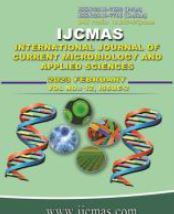


 National Academy of Agricultural Sciences (NAAS)
National Academy of Agricultural Sciences (NAAS)

|
PRINT ISSN : 2319-7692
Online ISSN : 2319-7706 Issues : 12 per year Publisher : Excellent Publishers Email : editorijcmas@gmail.com / submit@ijcmas.com Editor-in-chief: Dr.M.Prakash Index Copernicus ICV 2018: 95.39 NAAS RATING 2020: 5.38 |
Pyogenic infection refers to an infection that produces pus and is usually characterized by multiple focal inflammations due to microbial growth. The incidence of wound infection varies depending on various factors such as wound condition, microbial load and host defense mechanisms. The predominant wound pathogens are Gram negative bacilli such as Klebsiella pneumoniae, Escherichia coli, Pseudomonas aeruginosa, Enterobacter spp., Proteus spp.& Gram positive cocci such as Staphylococcus aureus, Coagulase negative Staphylococcus, Streptococcus spp., Enterococcus spp. and anaerobic bacteria such as Bacteroides, Clostridial spp. Klebsiella species acquired resistance to many antibiotic classes including β -lactams, fluoroquinolones, aminoglycosides by different mechanisms results in multidrug resistant strains. This study was performed in the department of Microbiology, in conjunction with the Surgery and Ortho department in a Tertiary care hospital. Microorganisms were identified by using standard methods. Antibiotic susceptibility test was done using modified Kirby Bauer’s disc diffusion method on Mueller Hinton Agar as per Clinical and Laboratory Standards Institute Guidelines. Phenotypic identification is done by Combined Disc Test, Double Disc Synergy Test, Modified carbapenem inactivation method (mCIM), EDTA- modified carbapenem inactivation method (eCIM), RapidecCarba NP test. Among those samples 306 organisms showed growth, which are identified and tested for antibiotic susceptibility testing. Among them 128 Klebsiella species isolates are grown & from those 11 klebsiella isolates showed resistance to Carbapenems and their Carbapenemase production is detected by a set of screening and confirmatory tests. Klebsiella spp. has been isolated in higher rates than any other bacteria in our study followed by E.coli, Pseudomonas aeruginosa. Prevalence of Klebsiella spp. is found to be 41.8% in which Carbapenem resistance is found to be 8.5%. Among them about 72.7% are confirmed for Carbapenemase production by mCIM and Rapideccarba NP test and 62.5% isolates are confirmed for MBL production by eCIM tests. This study exemplified that the more number of the Klebsiella spp. strains are found to be resistant to numerous antibiotics. To prevent infections due to multidrug resistant Klebsiella spp., a well formed team consisting of eminent treating clinicians, clinical microbiologists and the infection control team’s participation with appropriate intercommunication, focussed target action is much need of the hour.
 |
 |
 |
 |
 |